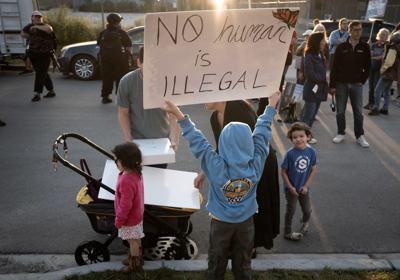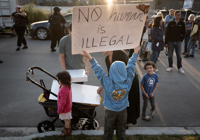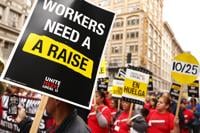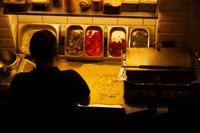
I’ve spent my career at the intersection of media and politics — newsrooms, press shops, campaigns — bouncing between the two worlds. Which means I’ve seen up close how quickly stories get shaped and, honestly, how uneven that process can be. It’s not always intentional, but some tragedies land with the weight they deserve, while others barely register. Some lives are wrapped in empathy; others are stripped of it.
And this week? It was that kind of week when the double standard shouldn't be overlooked.
The recent school shooting in Colorado that left one student dead. The assassination of the prominent conservative activist, Charlie Kirk. And, lastly, the latest apparent killing by an immigration agent today in Chicago, following the latest Supreme Court ruling that gave federal immigration agents sweeping profiling powers to keep targeting Latinos on little more than suspicion.
On the surface, these stories seem unrelated, but together, they reveal who gets to be human and treated humanely in America. Seeing some lives as less human lowers the barrier to violence, while moral accountability slips away.
Take the school shooting — the coverage is predictable. The vigils photographed, the weeping parents, the children hugging each other on videos across smartphones and television screens. For a minute, the coverage makes us feel the weight of the tragedy. And just as quickly, the narrative is reversed. Politicians shift the blame to "mental illness" or lone "bad actors." The system, the ubiquitous access to weapons of war and the deliberate blocking of even modest reforms are forgotten. The children are ignored. Their names, faces, dreams … they become abstractions in a conversation that rarely ventures out.
Then compare it to the murder of Kirk. Even before the facts had a chance to settle, his shooting was already being presented as proof of some deeper conspiracy, evidence of a war initiated by the “radical” left. He was not just lamented in right-wing circles; he was turned into a martyr, a clarion call. His humanity became the battle for retribution, overnight.
When the suspect was identified as a young, white cis man who came from a traditionally conservative and Christian household, the governor of Utah in a speech warned that “dangerous rhetoric” can lead to violence. Then immediately revealed his own bias, praying the shooter might be “someone else,” from another state or country. In doing so, he reinforced the very mindset that stokes division and fuels violence.
Before those events transpired, earlier in the week the Supreme Court essentially gave the green light so immigration agents could continue to detain individuals based on appearance, speech or even the nature of their work. In practical terms, being Latino is suspicious. This is not enforcement; this is terror unleashed on entire communities, tearing families apart from each other and uprooting people from the lives they’ve built. People with no criminal history, long held hostage in a broken immigration system — one that offers little or no realistic path to legalization while holding vast power to decide who does and does not belong — are being picked up by masked, unidentified authorities.
On Friday, days after that decision, a Latino man was shot in Chicago by an ICE agent. This is not an isolated incident; it’s a glimpse of what’s to come. At its core, it’s profiling — legalized and sanctioned at the highest levels. And it sends an extremely clear message: your rights, your safety, your place in this country are conditional.
When you map it all out, the pattern is hard to miss. Some tragedies get magnified and their participants are lifted to the status of martyrs or proof of national calamity. Others, disproportionately Black, Latino, immigrant, or LGBTQ+, get minimized, rationalized away. Their suffering gets normalized as background, maybe even inevitable.
And, I have to say, in both media and politics, I've seen how this becomes institutionalized. Dehumanization is not just rhetoric. It’s policy. It creates the permission structure for what comes next: harsher legislation, more strident calls for repression and rhetoric that edges closer to open warfare. And we’re already seeing that language slip from the fringes into the mainstream.
This is not a matter of measuring grief. All violent losses to it are tragedies. All are worthy families of sympathy. But we cannot pretend that the imbalance is how humanity itself is distributed. If empathy is one-sided, if lives are more equal than others, then we are already on shaky ground.
Every victim of violence, whether in a classroom, by the hand of a shooter or in the crosshairs of targeted, state-sanctioned profiling, must be seen as fully human. That ought not to be made dependent on race, ideology or immigration status.
And maybe it's an obvious sentiment, but it's one that we must continue to say out loud, loudly and repeatedly, because the moment we cease requiring full humanity for everyone, we make the next instance of violence, and the one after that, more likely.










(0) comments
Welcome to the discussion.
Log In
Keep it Clean. Please avoid obscene, vulgar, lewd, racist or sexually-oriented language.
PLEASE TURN OFF YOUR CAPS LOCK.
Don't Threaten. Threats of harming another person will not be tolerated.
Be Truthful. Don't knowingly lie about anyone or anything.
Be Nice. No racism, sexism or any sort of -ism that is degrading to another person.
Be Proactive. Use the 'Report' link on each comment to let us know of abusive posts.
Share with Us. We'd love to hear eyewitness accounts, the history behind an article.